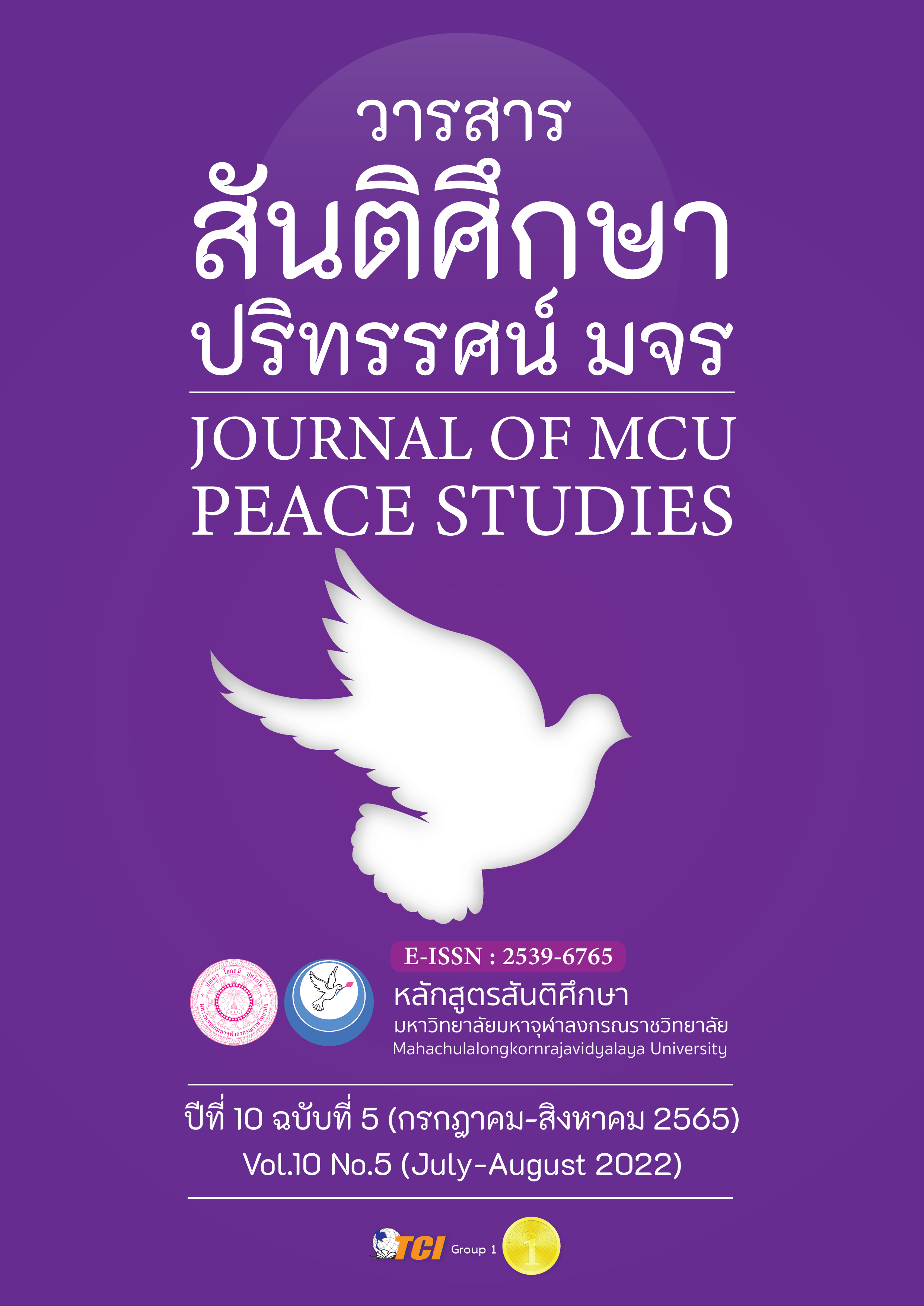การวิเคราะห์องค์ประกอบเชิงสำรวจของศักยภาพทางนวัตกรรม ของนักเรียนชั้นมัธยมศึกษาปีที่ 4
Main Article Content
บทคัดย่อ
บทความวิจัยนี้มีวัตถุประสงค์เพื่อวิเคราะห์องค์ประกอบเชิงสำรวจศักยภาพทางนวัตกรรมของนักเรียนชั้น มัธยมศึกษาปที่ 4 กลุ่มตัวอย่างคือนักเรียนระดับชั้นมัธยมศึกษาปีที่ 4 สังกัดสำนักงานเขตพื้นที่การศึกษามัธยมศึกษาพระนครศรีอยุธยา จำนวน 560 คน โดยใช้วิธีการสุ่มตัวอย่างแบบหลายขั้นตอน เครื่องมือที่ใช้ในการวิจัยคือแบบวัดศักยภาพทางนวัตกรรมมีลักษณะเป็นมาตราส่วนประมาณค่า 5 ระดับ
การวิเคราะห์ข้อมูลใช้การวิเคราะห์องค์ประกอบเชิงสำรวจด้วยวิธีการสกัดองค์ประกอบหลักและหมุนแกนแบบตั้งฉากด้วยวิธีวาริแมกซ์
ผลการวิจัยพบว่า ศักยภาพทางนวัตกรรมประกอบด้วย 3 องค์ประกอบ 17 ตัวบ่งชี้ ได้แก่ องค์ประกอบที่ 1 ความคิดสร้างสรรค์ทางนวัตกรรม ประกอบด้วย 7 ตัวบ่งชี้ ได้แก่ ความคิดคล่องแคล่ว ความคิดยืดหยุ่น ความคิดริเริ่ม ความคิดละเอียดลออ ความคิดเชิงวิพากษ์ ความคิดเชื่อมโยง และความคิดในการแก้ปัญหา องค์ประกอบที่ 2 การดำเนินงานทางนวัตกรรม ประกอบด้วย 4 ตัวบ่งชี้ ได้แก่ การทดลอง การปรับปรุง การทำงานร่วมกับผู้อื่น และการสื่อสาร องค์ประกอบที่ 3 บุคลิกภาพทางนวัตกรรม ประกอบด้วย 6 ตัวบ่งชี้ ได้แก่ ความช่างสังเกต ความช่างสงสัย ความใฝ่รู้ ความเข้มแข็งทางใจ ความกล้าตัดสินใจ และความมุ่งมั่นสู่ความสำเร็จ ค่าความแปรปรวนรวมคิดเป็นร้อยละ 63.919 โดยแต่ละองค์ประกอบอธิบายความแปรปรวนได้ร้อยละ 50.849, 7.170 และ 5.899 ตามลำดับ
Article Details

อนุญาตภายใต้เงื่อนไข Creative Commons Attribution-NonCommercial-NoDerivatives 4.0 International License.
ทัศนะและความคิดเห็นที่ปรากฏในบทความในวารสาร ถือเป็นความรับผิดชอบของผู้เขียนบทความนั้น และไม่ถือเป็นทัศนะและความรับผิดชอบของกองบรรณาธิการ ยินยอมว่าบทความเป็นลิขสิทธิ์ของวารสาร
เอกสารอ้างอิง
Bloom, B. S., Madaus, G. F., & Hastings, J. T. (1971). Handbook on Formative and Summative Evaluation of Student Learning. New York: McGraw-Hill.
Bykova, Y. A., & Istomina, S. V. (2018). Perceptions of the Innovative Potential of Students by Teachers of General, Secondary Vocational and Higher Education Institutions. Journal of Pharmaceutical Sciences and Research, 10(8), 2030-2033.
Dyer, J. Gregersen, H., Christensen, C.M. (2011). The Innovator’s DNA: Mastering the Five Skills of Disruptive Innovators. Boston, Massachusetts: Harvard Business Review Press.
Engel, K. Dirlea, V., Dyer, S., & Graff, J. (2015). Best Innovators Develop a Point of View on the Future and a Roadmap on How to Get There. Strategy and Leadership, 43(2), 15-22.
Klochko, V. Y., & Galazhinsky, E. V. (2009). Innovative Potential of Personality: Systemic Anthropological Context. Psychology in Russia: State of the Art, 2, 210-224.
Ministry of Education. (2008). Basic Education Core Curriculum B.E. 2551. Bangkok:
Agricultural Cooperative Society of Thailand Co., Ltd. Printing House.
Office of the Basic Education Commission. (2018). Guidelines for Quality Assessment According to Educational Standards, Early Childhood, Basic Education, and Basic Education of the Special Education Center, 2018. Retrieved May 3, 2019, from http://bet.obec.go.th/ index/wp-content/uploads/2018/08/nn3.pdf.
Office of the Education Council. (2019). National Education Standards in 2018. Nonthaburi: 21st Century Co., Ltd.
Office of the National Economics and Social Development Council. (2017). The Summary of the Twelfth National Economic and Social Development Plan During 2017-2021.
Retrieved April 5, 2019, from https://www.nesdb.go.th/download/plan12.pdf.
Patterson, F., & Zibarras, L. D. (2017). Selecting for Creativity and Innovation Potential: Implications for Practice in Healthcare Education. Advances in Health Sciences Education, 22(2), 417-428.
Rogers, Everett M. (1983). Diffusion of Innovations (3rd ed).The Free Press, A Division of Macmillan Publishing Co., Inc.
Shutenko, E., & Shutenko, A. (2015). Socio-Cultural Trends in the Development of the Higher School's Innovative Potential. Procedia-Social and Behavioral Sciences, 214, 332-337.
Siribanpitak, P. (2018). Thai Education in the 21st Century: Challenges in Educational Research. Bangkok: Srinakharinwirot University.
Sutthawart, W. (2015). Development of Program for Reinforcing The Educational Innovator Potentiality. (Doctoral Dissertation). Silpakorn University. Bangkok.
Sutthawart, W., & Siriwong, P. (2015). The Basic Educational Innovator in Public Sector: A Study for Grounded Theory. Veridian E-Journal, 8(2), 281-300.
Yangsuksathaporn, P., & Tangtherasunan, P. (2016). The innovator's method. Bangkok: Arrow Multimedia.


